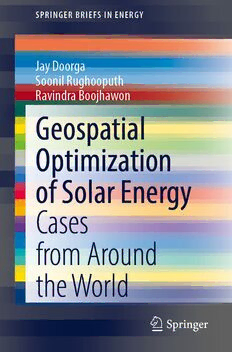
Geospatial Optimization of Solar Energy: Cases from Around the World PDF
Preview Geospatial Optimization of Solar Energy: Cases from Around the World
SPRINGER BRIEFS IN ENERGY Jay Doorga Soonil Rughooputh Ravindra Boojhawon Geospatial Optimization of Solar Energy Cases from Around the World 123 SpringerBriefs in Energy SpringerBriefsinEnergypresentsconcisesummariesofcutting-edgeresearchand practical applications in all aspects of Energy. Featuring compact volumes of 50 to 125 pages, the series covers a range of content from professional to academic. Typicaltopicsmightinclude: (cid:129) Asnapshotofahotoremergingtopic (cid:129) Acontextualliteraturereview (cid:129) Atimelyreportofstate-of-theartanalyticaltechniques (cid:129) Anin-depthcasestudy (cid:129) Apresentationofcoreconceptsthatstudentsmustunderstandinordertomake independentcontributions. Briefsallowauthorstopresenttheirideasandreaderstoabsorbthemwithminimal timeinvestment. Briefs will be published as part of Springer’s eBook collection, with millions of users worldwide. In addition, Briefs will be available for individual print and electronicpurchase.Briefsarecharacterizedbyfast,globalelectronicdissemination, standard publishing contracts, easy-to-use manuscript preparation and formatting guidelines,andexpeditedproductionschedules.Weaimforpublication8–12weeks afteracceptance. Bothsolicitedandunsolicitedmanuscriptsareconsideredforpublicationinthis series. Briefs can also arise from the scale up of a planned chapter. Instead of simplycontributingtoaneditedvolume,theauthorgetsanauthoredbookwiththe spacenecessarytoprovidemoredata,fundamentalsandbackgroundonthesubject, methodology,futureoutlook,etc. SpringerBriefsinEnergycontainsadistinctsubseriesfocusingonEnergyAnal- ysis and edited by Charles Hall, State University of New York. Books for this subseries will emphasize quantitative accounting of energy use and availability, including the potential and limitations of new technologies in terms of energy returnedonenergyinvested. Moreinformationaboutthisseriesathttps://link.springer.com/bookseries/8903 · · Jay Doorga Soonil Rughooputh Ravindra Boojhawon Geospatial Optimization of Solar Energy Cases from Around the World JayDoorga SoonilRughooputh FacultyofSustainableDevelopment& FacultyofScience,DepartmentofPhysics Engineering,DepartmentofEmerging UniversityofMauritius Technologies Reduit,Mauritius UniversitédesMascareignes RoseHill,Mauritius RavindraBoojhawon FacultyofScience,Department ofMathematics UniversityofMauritius Reduit,Mauritius ISSN2191-5520 ISSN2191-5539 (electronic) SpringerBriefsinEnergy ISBN978-3-030-95212-9 ISBN978-3-030-95213-6 (eBook) https://doi.org/10.1007/978-3-030-95213-6 ©TheAuthor(s),underexclusivelicensetoSpringerNatureSwitzerlandAG2022 Thisworkissubjecttocopyright.AllrightsaresolelyandexclusivelylicensedbythePublisher,whether thewholeorpartofthematerialisconcerned,specificallytherightsoftranslation,reprinting,reuse ofillustrations,recitation,broadcasting,reproductiononmicrofilmsorinanyotherphysicalway,and transmissionorinformationstorageandretrieval,electronicadaptation,computersoftware,orbysimilar ordissimilarmethodologynowknownorhereafterdeveloped. Theuseofgeneraldescriptivenames,registerednames,trademarks,servicemarks,etc.inthispublication doesnotimply,evenintheabsenceofaspecificstatement,thatsuchnamesareexemptfromtherelevant protectivelawsandregulationsandthereforefreeforgeneraluse. Thepublisher,theauthorsandtheeditorsaresafetoassumethattheadviceandinformationinthisbook arebelievedtobetrueandaccurateatthedateofpublication.Neitherthepublishernortheauthorsor theeditorsgiveawarranty,expressedorimplied,withrespecttothematerialcontainedhereinorforany errorsoromissionsthatmayhavebeenmade.Thepublisherremainsneutralwithregardtojurisdictional claimsinpublishedmapsandinstitutionalaffiliations. ThisSpringerimprintispublishedbytheregisteredcompanySpringerNatureSwitzerlandAG Theregisteredcompanyaddressis:Gewerbestrasse11,6330Cham,Switzerland InMemoryofMrBeeshamsinghDoorga, nowinHeaven Foreword Thecostsofnewrenewableenergysourceshavefallendramaticallyinrecentyears. Itisincreasinglyclearthatrenewableswillplaythecriticalroleinfutureelectricity systems,astheglobaleffortfordecarbonizationgatherspace.Moreover,theglobal solar resource vastly exceeds humanity’s demand for energy. And this resource is best in the countries within, and close to, the tropics. So solar electricity will be criticaltothesustainabledevelopmentofthegrowingeconomiesinthesecountries. Butknowingthatsolarenergywillbeimportantisonlypartofwhatweneedto understand. There are other questions. What is the relative importance of rooftop installationsandsolarfarms?Andhowshouldthelatterbelocated,giventheimpor- tantconstraints,suchasloadproximity,networkconnection,topography,ecological impactsandotheroptionsforuseofthesameland? The authors of this book have produced an excellent manual for answering these questions. Starting from the fundamental science, and using state-of-the-art geographicalinformationsystems’approachesforresourceassessment,theysystem- aticallyaddressthekeyissues.Theresultisaninvaluableguidefordecision-makers seeking to make best use of solar energy, and an excellent resource for everyone interested in the challenge of deploying the world’s most important renewable resource. October2021 Prof.NickEyre EnvironmentalChangeInstitute UniversityofOxford Oxford,UK vii Preface The increasing energy demand stemming from rapid urbanization and economic developmentiscausingseriousstrainonthedwindlingreservesoffossilfuels.With thealarmingriseinglobaltemperaturesincepre-industriallevels,theglobalcommu- nityiscallingforimmediatesustainableactions.Blessedwiththeabundanceofsolar resources, mostly concentrated in the tropical and sub-tropical regions, countries worldwidearetappingintothisenergysource.Theintegrationofsolarenergyinthe globalenergymixisbeingacceleratedbythesignificantdeclineinthecostofphoto- voltaicmodulesovertheyears.However,theimplementationofphotovoltaicfacili- tiesnecessitatesubstantiallandresources,whichisbecomingscarcewithpopulation growth,competinglanduses,andclimatechange. Thisbriefprovidesanoverviewonhowcountriescansustainablyplantheirland resourcessoastomaximizesolarenergyyieldwhilstminimizinglandspace.Three mainthemesarecovered:Modellingthesolarradiationclimatetooptimizeonland resources;Determiningbestregionsforutility-scalesolarfacilities;Exploitationof availablerooftopspacetodampenlandrequirements.Thepolicyimplicationsthat wouldhelpcountriesboosttheirsolarenergymarketsarealsoelaborated. Thisdocumenthasbeencompiledwiththehopethatitmayserveasareference toprovideaninformeddecisiontoallthosewhoareconcernedwiththeenthusiastic task of promoting sustainable development through the efficient harnessing of the solarresource.Theorganization ofthisdocumentisinsuchawayastoprovidea comprehensiveknowledgeandguideonhowtoexploitthesolarenergyresourceto awideaudience,rangingfromresearcherstopolicymakersandpeopleingeneral. RoseHill,Mauritius Dr.JayDoorga October2021 Prof.SoonilRughooputh Assoc.Prof.RavindraBoojhawon ix Acknowledgements WewouldliketoacknowledgethesupportofAngelikiAthanasopoulou,CecilJoselin Simon and Cynthia Kroonen for coordinating this book project. The completion of this work would not have been possible without the inputs from NASA Earth Observation,MauritiusMeteorologicalServices,RevueAgricoleetSucrièredel’Île Maurice, OpenStreetMap, Ministry of Housing and Lands (Cartographic Section), andStatisticsMauritius.WeextendourthankstoRyanTannooforthearchitectural layout of the Solar City design proposed. The facilities and resources provided by theUniversitédesMascareignesandtheUniversityofMauritiusarealsogratefully acknowledged. xi Contents 1 Introduction .................................................... 1 1.1 GlobalEnergyContext ...................................... 1 1.2 SolarResourcePotentialandGeospatialConstraints ............. 2 1.3 ScopeofThisWork ......................................... 3 1.4 BookStructure ............................................. 4 References ...................................................... 4 2 SolarEnergy .................................................... 7 2.1 RadiationJourneyfromSuntoEarth .......................... 7 2.2 SolarRadiationBudget ...................................... 8 2.3 SolarSpectrumTheoryandAtmosphericInteraction ............ 9 2.4 SolarRadiationComponents ................................. 10 2.5 PhotovoltaicEffect ......................................... 12 2.6 PhotovoltaicSolarEnergy ................................... 13 2.7 MeasurementofSolarParameters ............................. 13 2.8 Spatio-TemporalVariationsinInsolation ....................... 15 2.8.1 Seasonal,Latitudinal,andDailyVariations .............. 15 2.8.2 CloudCoverandTopographicInfluence ................. 15 References ...................................................... 16 3 GeospatialModellingofSolarRadiationClimate ................... 19 3.1 SolarResourceAssessmentandOptimization .................. 19 3.2 Satellite-BasedResourceAssessment ......................... 20 3.3 WeatherResearchForecasting(WRF) ......................... 21 3.4 RegressionAnalysis ........................................ 22 3.5 ExtraterrestrialSolarRadiation ............................... 24 3.6 SolarRadiationModels ..................................... 24 3.6.1 Sunshine-BasedModels .............................. 25 3.6.2 Temperature-BasedModels ........................... 25 3.6.3 Cloud-BasedModels ................................. 27 3.6.4 Hybrid-Parameter-BasedModels ....................... 28 xiii
